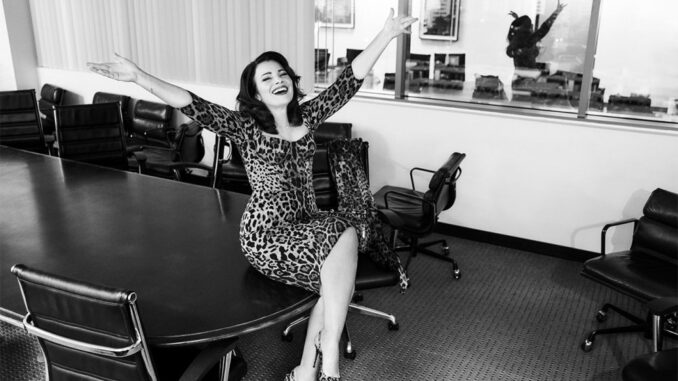
With the strike (finally) behind her, the SAG-AFTRA chief also talks about her CEO sparring partners, her famous plushie and the Barbara Walters-esque future that she’s eyeing next.
“I’m an unlikely labor leader,” Fran Drescher acknowledges on a late November evening.
Before this summer, Drescher long had been synonymous in the public imagination with her most iconic role, Fran Fine, in the popular ’90s CBS sitcom The Nanny, which she tailored to her comedic strengths, including her thick Queens accent. The sassy childcare worker to a posh New York family became inextricably linked with her persona, even after Drescher launched other sitcoms, started a cancer nonprofit and, eventually, was elected as the president of Hollywood’s largest union, SAG-AFTRA, in 2021. But her public profile took a dramatic turn after SAG-AFTRA called a strike in July, joining the Writers Guild of America in the first double work stoppage involving the two unions in more than 60 years. In the spotlight during the months that followed, Drescher carved out a new lane with her distinctive advocacy for her 160,000 members: at once fierce and combative (yes, she asked if Disney CEO Bob Iger was an “ignoramus”) and vulnerable, proudly bringing her heart-shaped plushie, which she calls “Love,” to labor negotiations with top Hollywood CEOs. Though some on the studio side grumbled, the approach did result in an end to the strike on Nov. 9 after the union’s negotiating committee — chaired by Drescher — approved a tentative deal.
With the 2023 strike finally behind her — on Dec. 5, more than 78 percent of voting SAG-AFTRA members ratified the union’s deal — Drescher opens up about those grueling CEO sessions, a Nanny reboot and her future.
You sat across the negotiating table from four top Hollywood studio chiefs. What surprised you most about each of them?
Bob was more charming than I gave him credit for. Donna [Langley] was demure. I saw she was trying to get a word in, and the three guys [Iger, Netflix’s Ted Sarandos and Warner Bros. Discovery’s David Zaslav] were not even aware of it. I was repulsed by what I was seeing. I actually was the one from across the table that said, “I’d like to hear what Donna has to say because none of you are letting her get a word in edgewise.” They were taken aback, [but then] everything stopped so she could speak. At the end of that, she thanked me. She’s not a girl from Queens like me — we don’t take no shit. Ted, interestingly enough, gets more aggressive in the room, but all the A-listers who work for him think that out of all [the CEOs], he’s the best one.He’s doing his job well.
I guess so. Then David and I had a connection when we were kids. My first cousins and their dad, Stanley Drescher, had clocks made all over the town where the Zaslav kids lived. He remembers how every store you went into, there was a clock that said, “Relieve the pressure, insure with Drescher.” We talked about that. And one of [the CEOs], I don’t want to say who, wrote me when the strike ended and very graciously said, “It was a rough go. I’m glad it’s over. I learned a lot. You were the maestro and you won. Congratulations.”What was it like to sit across from Bob Iger after you took him to task for saying that writers and actors were not being “realistic” in an interview, even asking if he was an “ignoramus”?
He was fine. In a sideline conversation, not with me, he did express that he didn’t appreciate the attitude that I had taken with regards to him. He regretted saying what he said. But having said that, he didn’t feel [my remarks were] necessary. Well, of course he didn’t feel that it was necessary, but it was necessary. Because what he said and what I said in my speech bookended what this whole thing was about in such a vivid way that it had to be underscored. Having said that, once we got into the room together, we were absolutely civil with each other. There were times when we all laughed about other things. There were moments when the guys would get a little heated, and I would have to bring it back to reality. I’ve said many times, “Dial it down, we’re not curing cancer.” Plus, that kind of male aggression doesn’t work on me.You’ve said “the guys” would get a little heated. Is that on both sides — labor and management?
They all took turns, including the men in the [SAG-AFTRA] negotiating committee. I’ve never been confronted with so much aggressive male energy. And it made me sad [to think] that’s why the world is in the state that it’s in. If they could just step out of the way and let the mothers get into a room together, cook some food, share some family stories, exchange pictures, hold hands and really figure out how to get past this, the world could be saved.
How did you try to bring female energy into the room, and how was it received?
First of all, I didn’t mind having my little plushie toy. I’d a
